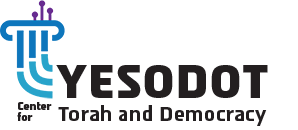The Broken Covenant: Does Someone Who Didn’t Serve in the Army Deserve to Influence the Fate of the Country?
When one sector in a country only wants to receive and not give, it is the right or even the duty of the country to deny their right to influence and sit around the decision-making table.
After a year and a half of fighting, and while a particularly creative law is being drafted in the Knesset that will continue to exempt ultra-Orthodox society from conscription, we have an excellent opportunity to ask ourselves what our democracy looks like and whether it’s legitimate to say that if a person is not involved in defending the country, he cannot be involved in its decision-making. These are questions that keep coming up in recent years. Can a minister whose children don’t serve in the IDF send other people’s children to the battlefield? Can someone who does not recognize the State of Israel serve as a minister in it?
The Sages treated those who do not participate in the public’s suffering with great severity, to the point that the Talmud in Tractate Taanit demands that “when the public is in sorrow, let no one say, ‘I will go to my house and eat and drink, and peace be upon you,'” and states that anyone who does so is liable to death. The Talmud takes the example of such leadership from Moses, who, during the war with Amalek, did not sit comfortably on a soft seat or mat but rather grieved with the Israelites who were in a state of war.
In the late 1980s, Rabbi Chaim David Halevi presented his worldview regarding the interaction of Torah and a democratic government at a conference held on the subject. After explaining that Jewish law does not deny rights to those who do not pay taxes, he sought to translate this into the reality of the modern State of Israel: “Within the framework of political life, this rule certainly does not apply, and the right to vote is not measured by whether one pays taxes, but rather by a supreme value; the obligation of all citizens to enlist in the army. There is no doubt that no one is exempt from this obligation, rich or poor, and the law is that the one who sacrifices his life for the security of the state has the right to determine its lifestyle, its fate, and its future.”
There is an unwritten covenant of rights and obligations between a country and its citizens, a covenant that we avoided discussing for many years and calmly allowed to continue according to the status quo.
Perhaps now is the right time to reopen the discussion and echo Rabbi Halevi’s words: Partnership and participation are required in a country. And when one side only wants to receive and not give, it is the right and perhaps the duty of a state to say, “That’s a red line,” and not just deny benefits such as discounts on daycare or admission to academia, but also the right to influence and sit around the decision-making table.
US President John F. Kennedy coined the phrase, “Ask not what your country can do for you, ask what you can do for your country,” and perhaps following his example, we should begin to ask: What can the country do for those who are not willing to do for it?
The writer is a content editor at Yesodot – The Center for Education, Torah, and Democracy.


